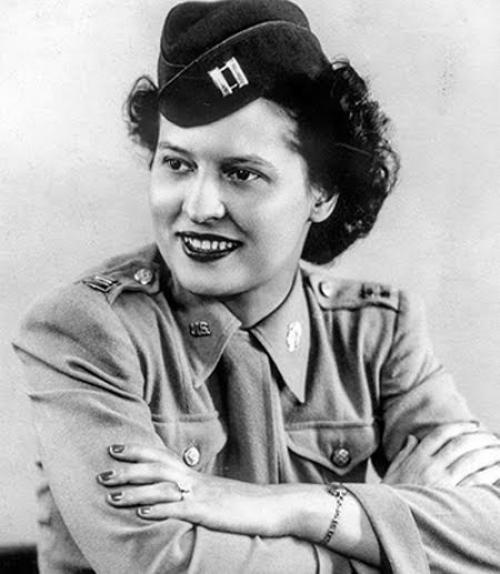Stephanie Czech Rader '37, a chemistry graduate who became a U.S. spy in Europe at the end of World War II and died Jan. 21, was posthumously awarded the Legion of Merit before her burial June 1 at Arlington National Cemetery.
Barbara Baird, senior associate dean for math and science in the College of Arts & Sciences, spoke during Rader’s service about Rader’s “pioneering spirit, her sense of duty and opportunity,” and her many contributions to the United States of America.
“Stephanie Czech entered [the U.S.] during the Great Depression, a daughter of immigrants blessed with a rigorous mind and a strong work ethic; she was awarded a full scholarship,” Baird said. “As a successful student in the sciences, in chemistry, she clearly embodied the ideals set forth in Cornell’s founding. I can tell you that even now, chemistry is a tough subject for most. Major Stephanie Czech Rader was one of very few [women], blazing the trail for women in the late 1930’s.”
After earning her Cornell degree, Rader worked as a librarian and researcher at the Texas Oil Co. in New York City before joining the first 80 trainees for the Women's Army Auxiliary Corps (WAAC) at the outbreak of World War II. WAAC became the Women's Army Corps, and she was one of the first 440 women selected to participate in a six-week officer candidate training class at Fort Des Moines, Iowa. She quickly rose to the rank of captain and in the waning months of the war, she also became a spy for the U.S. government.
Rader was recruited by the Office of Strategic Services (OSS), a precursor to the Central Intelligence Agency. Raised in Poughkeepsie, New York, by parents who were emigrants from Poland, she had always been immersed in Polish culture and language, and so the OSS assigned her to Warsaw in late 1945.
Working undercover as a U.S. embassy clerk who was attempting, in her spare time, to reconnect with distant relatives in different parts of Poland, Rader traveled far and wide across the Russian-occupied country while gathering intelligence on Soviet troop movements and other population data.
Rader’s superiors nominated her for The Legion of Merit, which honors “exceptionally meritorious service,” in 1946, but that recommendation was ignored for unknown reasons, according to a press release from Sen Mark R. Warner’s office, which announced the award. When the historical records of the OSS were recently declassified and the extent of Rader's intelligence activities became known, the OSS Society enlisted the support and assistance of Warner to push the Army to reconsider her nomination.
“The men and women who quietly serve America's intelligence agencies do not seek attention, and they do not expect to receive medals or commendations for their service. Stephanie Rader certainly did not pursue this honor for herself: she was twice nominated for the Legion of Merit by her superiors seven decades ago,” Warner said in the press release. “Stephanie Rader was a trailblazer for women in the 'old boy network' at the OSS, and we can find no legitimate reason why this recommendation was denied, other than the pervasive gender discrimination which existed in the early days of the American intelligence community right after World War II.”
Among Cornell’s oldest alumni, Rader participated in Cornell's sesquicentennial celebrations -- she was honored at a Washington, D.C., event in November 2014, where she was welcomed on stage at the Warner Theatre with resounding applause in front of a crowd of more than 800 fellow Cornellians. She was also a strong supporter of the chemistry department, specifically of female students trying to break through barriers she once faced.
This story includes excerpts from a story on Rader that appeared in the February 2016 edition of Ezra Update.




